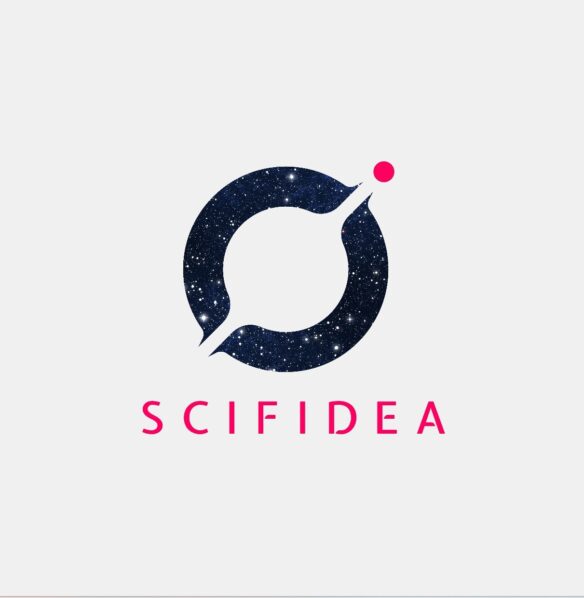SciFidea’s international Dyson Sphere-Themed story contest opened in March 2023 offering cash prizes — $20,000 apiece to the ten winners, and $2,000 each for another ten shortlisted stories – with the entries to be judged by some of the field’s leading professionals. SciFidea named the winners this week, however, they now say they don’t have the money to pay the prizes.
The SciFidea brand was launched in Singapore in 2021 by founder Tang Feng (who self-identified as Liu Cixin’s editor) and chief editor Lynn Sun. Their SciFidea Dyson Sphere story competition had both a domestic (Chinese-language) and an international (English-language) side. On January 30, 2024 SciFidea announced the 11 winners of the domestic competition.
SciFidea had a presence at Chengdu Worldcon, but based on the Chinese-langauge conreport Lynn Sun published in December (under the name Dongfang Mu — “I go by Dongfang Mu in Chinese” Lynn Sun said on Facebook) it seems there were issues behind-the-scenes. In fact, by the time the report was posted Lynn Sun (Sun Lin) had already left SciFidea, leading to an exchange in social media where she said finances were her real reason for doing so.
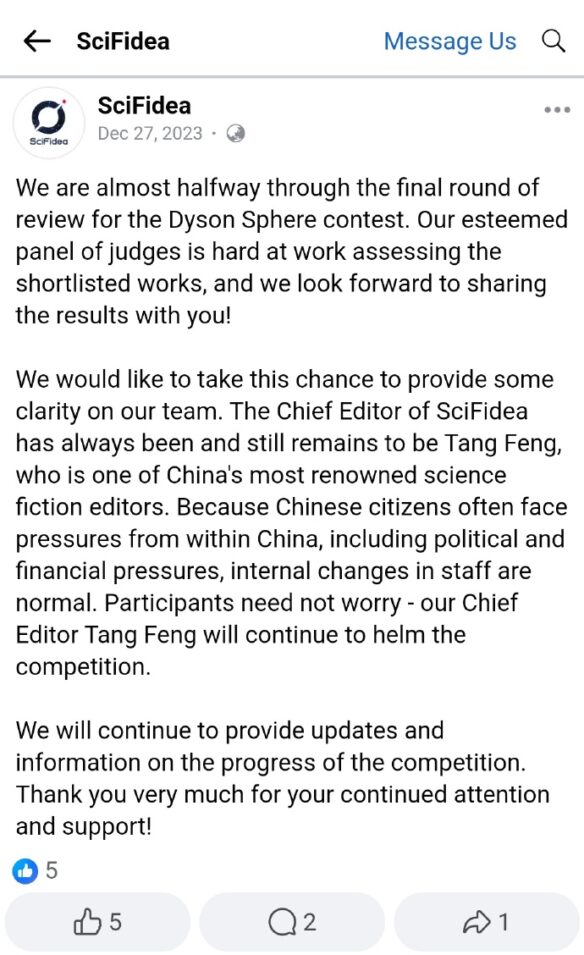
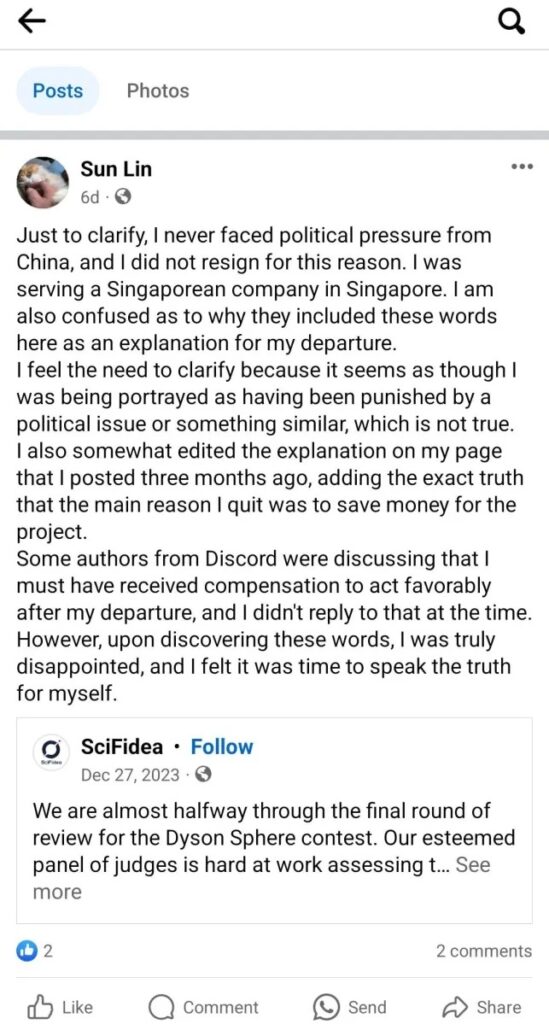
Then, on March 20, a Chinese-language announcement confirmed that SciFidea had declared bankruptcy, and the domestic side of the Dyson Sphere competition would be suspended. (Via Science Fiction Lightyear). Google Translate renders the announcement into English as follows (with minor manual edits):
Statement on the suspension of the Dyson Sphere Global Essay Contest
According to the competition schedule, the awarding of the “Dyson Sphere Global Essay Competition” was originally scheduled to be completed in February 2024. However, SciFidea’s capital chain was broken and it was no longer able to maintain the continued operation of the essay competition. It has now been decided to suspend the competition, and the project entity has also declared bankruptcy.
SciFidea waives all rights to all entries, and will no longer pay remuneration to participating authors and judges. All fees paid for this project will also be waived.
SciFidea is the operator of the Dyson Sphere Global Essay Contest. When the project investors and sponsors no longer support it, and after I continued to operate it with personal funding for a period of time, it is really unsustainable. I am deeply sorry for this difficult decision!
SciFidea will close the website, related accounts and servers in the near future to avoid the risk of illegal leakage of user information and work content. The winning author of the competition will be issued an electronic award certificate. Due to the large number of contestants, it is impossible to notify everyone one by one, so we hereby make this public statement.
Tang Feng
March 20, 2024
Having learned the fate of the competition’s domestic side, File 770 wrote to the contest’s email to ask about the status of the international competition. The “SciFidea Editorial Team” sent a partial answer, saying “We have indeed been keeping the judges of the English side updated on the latest status of the contest”, and that an official announcement would be coming on their Facebook page.
The SciFidea Facebook announcement came out March 26 – releasing the names of the winners, but also stating they “are temporarily unable” to pay the prize money while pursuing new sponsors.
Dear participants and supporters, thank you for your patience. We are thrilled to announce the results of the SciFidea Dyson Sphere Contest!
The 20 shortlisted works were carefully deliberated and evaluated by our esteemed panel of judges based on the established criteria and scoring rubric, which we have previously published on our website as well as our Facebook page. The works with the ten highest total scores were then designated as the winning works.
Attached below in this post are the results of the contest, including the titles and authors of the winning and shortlisted works, in no particular order. All winning and shortlisted authors can expect to receive a certificate as a record of their outcome in the SciFidea Dyson Sphere Contest, for their future use.
Please join us in congratulating the winners for their creativity and outstanding works!
We would also like to express our gratitude to all participants for your submissions and continued attention. Your passion and talent is truly commendable, and we hope that you have gained much from the experience of the contest itself.
Last but not least, we would like to thank the judges for being a part of the contest: Phoenix Alexander, Neil Clarke, Patrick Nielsen Hayden, Nancy Kress, Derek Kunsken, Robert J. Sawyer, Michael Swanwick, and Liza Groen Trombi. Your continued contributions and efforts have been truly invaluable to the contest, and we are inexpressibly grateful for your help.
The SciFidea Dyson Sphere Contest faced delays due to problems with our funding sources. As a result, we are temporarily unable to award the prize money for the time being, but we are currently pursuing new avenues of sponsorship. Please give us some time, and we will provide updates on the next steps of the contest in due time.
We have been in contact with the shortlisted authors and the judges, all of whom have been notified as to the results and the situation of the contest. We will continue to update the authors and judges on the next steps of the contest whenever more concrete information is available.
Thank you once again for your participation and support!
Here is the list of winners.
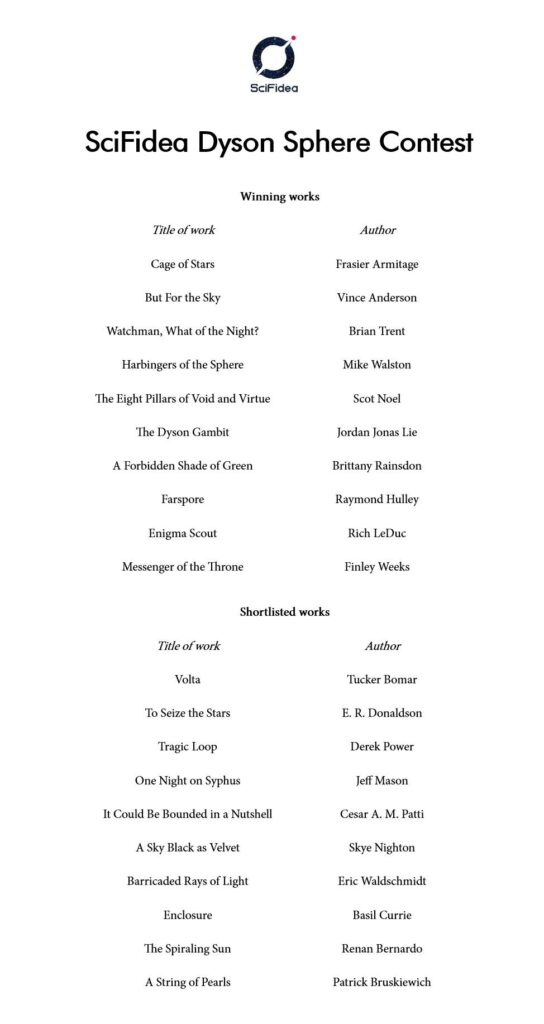
TRYING TO UNDERSTAND SCIFIDEA. Where were the funds to pay the prizes supposed to come from?
SMALL BEGINNINGS. According to a promotional article published by Pandaily in May 2023 (“Dyson Sphere: A New Trend in Global Science Fiction! Exclusive Interview with SciFidea’s Chief Editor”) the entity was started three years ago.
Reporter: Can you share with us how SciFidea was developed and launched back in 2021?
Lynn Sun: Sure. SciFidea started as a popular column named “奇想”(QiXiang) in the well-known Chinese SF magazine Science Fiction World. “Qixiang” means fantastic ideas literally, and it refers to the ideas or inspirations for science fiction. We then created a new word – SciFidea – for its English version. It was a new venture. When I joined Tang’s team, there were only Tang and me, a tiny startup with a big science fiction dream. We did all the work, editing, publishing, advertising… you name it! It was not until the second year that we started to have other workmates.
PARALLEL CONTESTS. The winners of the domestic side of the Dyson Sphere competition were named in January 2024, according to a March 10 SF Light Year post. Here’s the Google Translate rendition of the relevant paragraph:
The Dyson Sphere Essay Competition organized by Scifidea, a Singaporean international brand founded by the backbone of China Online’s science fiction platform “Fantasy Universe”, is divided into domestic and international competition areas. The domestic competition area announced on January 30, 2024 that 11 award-winning works have entered the signing process (Figure 1, link: Weibo text I confirmed with individual winners. After the announcement at the end of January, there was actually no follow-up contact at all and no one followed up on the signing matters.) The foreign competition area launched at the same time announced on November 30, 2023 (Figure 2) 20 shortlisted works selected from 205 entries, and it is expected that the top 10 finalists will be announced at the end of January, but it has been postponed several times to date.
SCIFIDEA’S “IP INVESTMENTS”. SciFidea used an unusual business model, where stories were promoted as “IP investments”. Per their tweets and information on their website, users would “subscribe to” individual stories. Subscribing would not only allow users to read the stories via the SciFidea app, but also promised users ownership, governance and profit-sharing benefits in those stories.
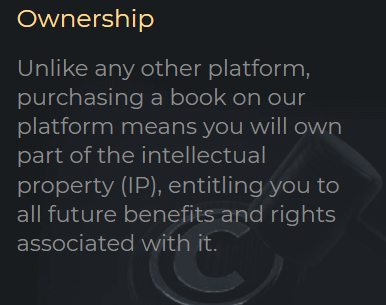
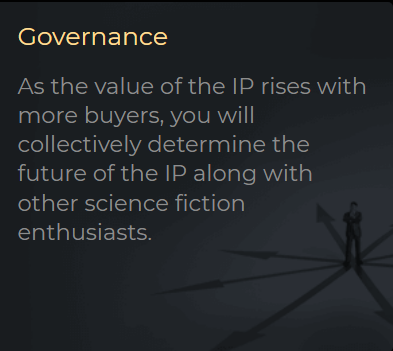
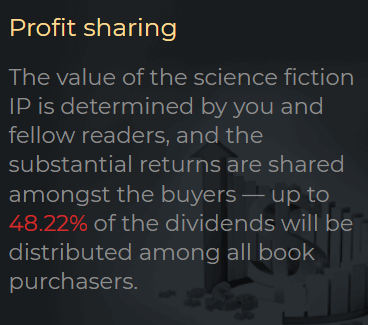
The app used a virtual currency of coins to purchase/subscribe to stories. Stories would be initially priced at one coin ($0.01 USD), but each additional subscriber would increase the price of a story by 1 coin, up to a theoretical maximum of 200,000 coins ($2000 USD). As of March 28th, the price range of the stories on the site is between 315 and 1756 coins ($3.15 to $17.56).
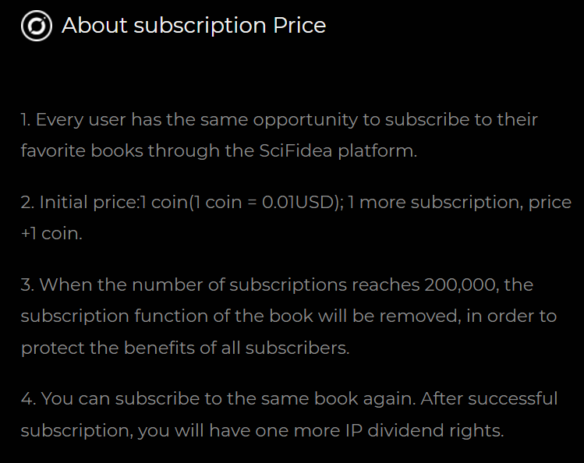
The Scifidea FAQ page also had a rule to keep users from gaming their investment:

SCIFIDEA’S RIGHTS TO CONTEST ENTRANTS. Per the contest page on the SciFidea website, the authors of the shortlisted works “will be required to allow us to make it publicly and freely available on our website for a year”, with non-winning authors receiving $2000.
The ten winning authors “will each receive US$20,000”, but would be required to “agree to grant SciFidea a ten-year publishing license to that work, with the US$20,000 prize being an advance against royalties. The author will share 50% of the net income on print publishing rights (including foreign languages in foreign countries), and another 30% of the net income from developing your work into other media (film, television, animation, graphic novels/manga, and so on).”, with the possibility of a further 10 year license if the work has been adapted or similar.
Whether those winning works could or would be utilized in a similar “IP investment” sales model wasn’t explicitly stated.
MARTIAN SIDESHOW. Another thing SciFidea did to attract interest was this curious promotion about “tickets to Mars” which appeared on their site/app in September 2023:
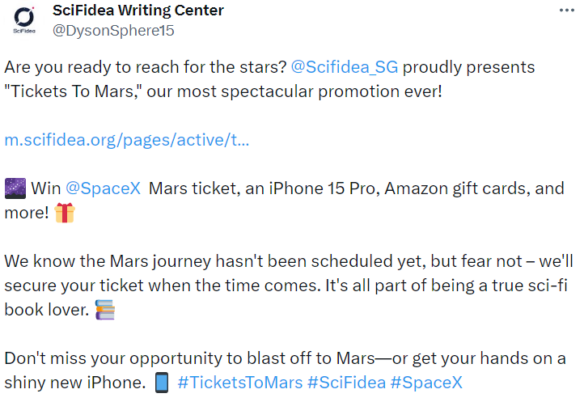
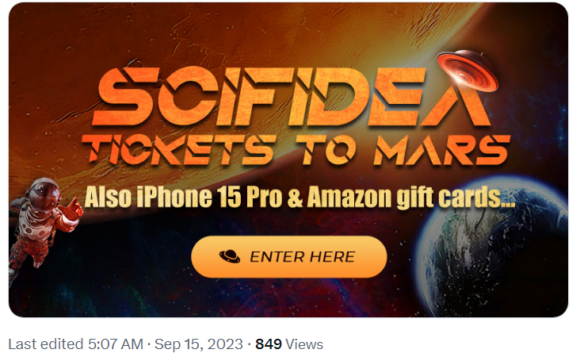
A FINAL WORD FROM LYNN SUN. Two weeks ago, before SciFidea publicly announced it had filed bankruptcy, Lynn Sun made this statement on Facebook because people were still contacting her about the contest.
..Although my new project has recently been established, since my former employer SciFidea seems to be out of management, some authors from both China and the West have still reached out to me.
I feel the need to clarify the situation so that my new project isn’t adversely affected. It wouldn’t be fair to me or my team otherwise.
The founder and director of SciFidea has always been Tang Feng. The project was curated under the company ChineseAll Digital Publishing Co., Ltd., with their Singaporean branch being Col Web Pte Ltd. We were all employees of this company. Due to the organizational structure, I wasn’t supposed to know anything about the situation between Tang and his supervisor, so what was happening to SciFidea was actually beyond my knowledge….
…I’m not sure how SciFidea is doing now. Although I really wanted to help, some things are simply beyond my control. However, their issues have affected me directly or indirectly, which naturally frustrates me. Judges who used to trust them (or maybe even “us”) a lot might resonate with similar emotions, which makes me feel very sorry and sad about this.
So, let me just express my appreciation for all the effort that has been put into the contest, while I was still managing it.
Firstly, the judges were very responsible, they even helped to check through the contracts between the company and the authors before they took on the job. They only did this to help build a bridge between China and the West, payment was secondary.
As for me and the editorial team, we fulfilled our responsibilities, which allowed everything to proceed smoothly within our scope of work….
CONCLUSION. Unfortunately, overshadowing everyone’s good work is the issue that SciFidea induced people to enter a competition with promises of large cash prizes which they do not have the resources to pay.
[Thanks to Ersatz Culture for providing the research used in this article.]

